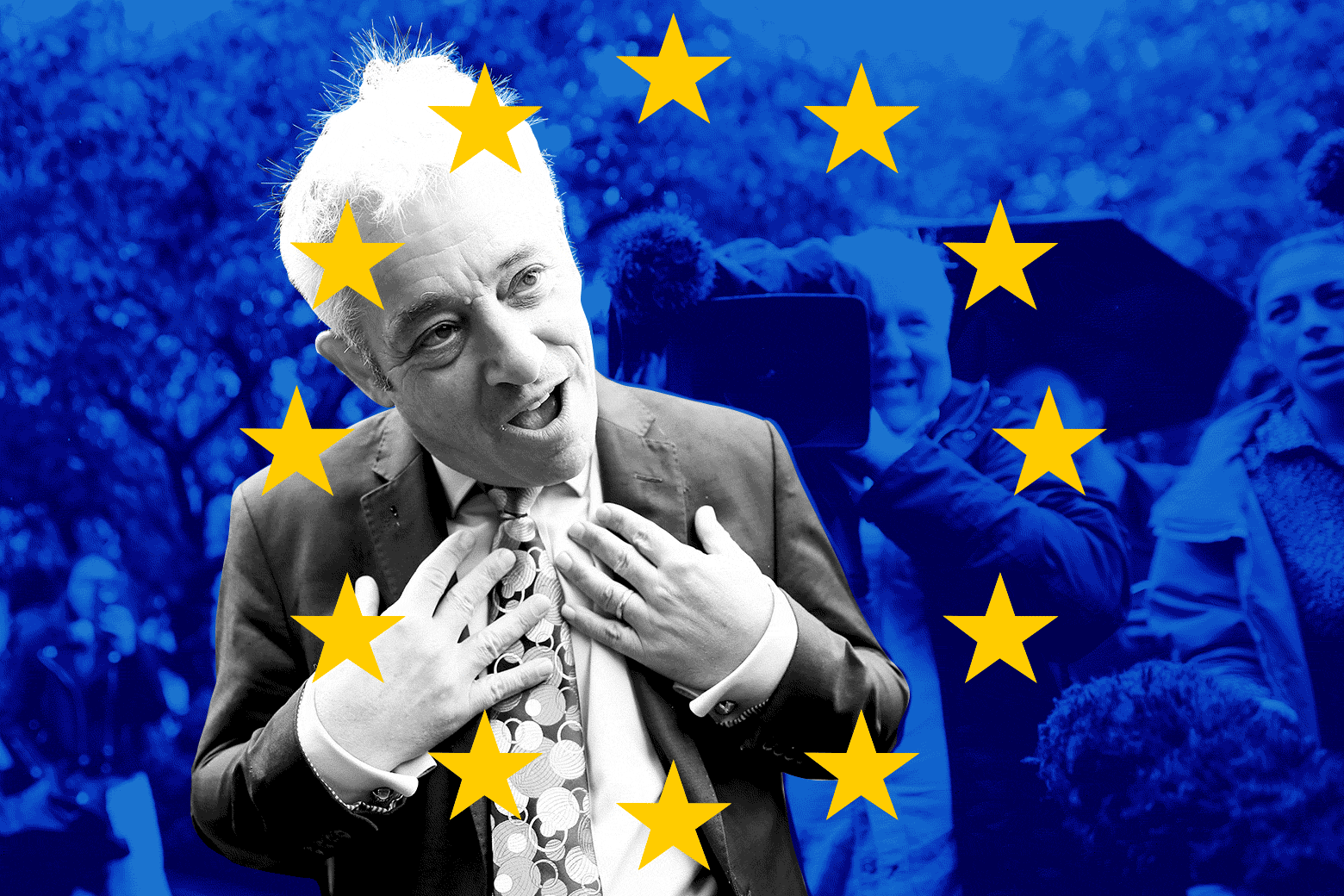
Speaker John Bercow
Photo illustration by Slate. Photo by TOLGA AKMEN/AFP/Getty Images
Reflecting on the French coups of 1799 and 185, Karl Marx famously wrote that history repeats itself, “the first time as tragedy, the second time as farce.” But Marx never had to contend with Brexit, where history repeats itself far more than twice and the farce and tragedy come in equal proportion. Yes, it was a very messy Week in Brexit:
This Week in Court: In the marquee event of this week, the U.K.’s highest court ruled on Tuesday that Johnson’s move to suspend Parliament for over a month starting in early September was unlawful. As the Supreme Court’s president, Lady Hale, put it, suspending—“proroguing” to use the legal term—Parliament is unlawful if it has “the effect of frustrating or preventing the ability of Parliament to carry out its constitutional functions without reasonable justification”.
Johnson’s justification, that he was suspending Parliament in order to give a Queen’s Speech to lay out his new governing agenda, was not considered reasonable. The court’s ruling did not—at least not as explicitly—go as far as a previous ruling by a court in Scotland that Johnson had misled the Queen by asking her to suspend Parliament.
Speaker John Bercow quickly announced that Parliament would return on Wednesday. In New York for the UN General Assembly, Johnson said he disagreed with the decision but would abide by it.
The court’s ruling was a major rebuke to Johnson and, for British politics, an unusual one. The Supreme Court was only established a decade ago and has played a much less active role in hot-button political disputes than its counterpart in the U.S. (The British media has been running features on Hale’s jewelry and past life as a bartender as if she just appeared on the scene, though she’s been in her role for two years.)
But while it was a major political development, it’s not clear how much this actually changes for Brexit. Parliament is back, but Johnson’s opponents already did what they needed to earlier this month by passing legislation that requires him to ask the EU for another Brexit extension if he hasn’t negotiated a new deal by Oct. 19. Labour Party leader Jeremy Corbyn has also made clear that he’s not going to trigger a new election until the extension happens.
So, we’re basically back where we were in the first week of September, but now we know who Lady Hale is.
This week in death threats: On Wednesday, Parliament’s first day back since the court ruling, the debate took a very dark turn when Johnson used the legacy of a murdered colleague to push for his agenda.
MPs repeatedly challenged Johnson over his heated rhetoric and use of the term “surrender bill” to describe the anti-no-deal Brexit legislation passed in early September. Several noted that MPs have been receiving an increasing number of death threats which often echo this type of rhetoric.
At one point, Labour MP Paula Sheriff made an emotional speech accusing Johnson of putting her and her colleagues lives at risk and invoking the memory of Jo Cox, a Labour MP and remain supporter, who was murdered by a far-right extremist during the run-up to the Brexit referendum.
Johnson dismissed her remarks as “humbug.”
After he was pressed again by Tracey Brabin, who is Cox’s successor representing Batley and Spen in West Yorkshire, Johnson said that “the best way to honor the memory of Jo Cox and indeed the best way to bring this country together would be, I think, to get Brexit done.”
MPs have called on him to apologize for the remark, which he has not done. Cox’s husband said he was “shocked” by the exchange. “To descend into this bear pit of polarization is dangerous for our country,” he told the BBC. “It creates an atmosphere where violence and attacks are more likely.”
This week in Europe: Now that Parliament has probably taken a no-deal Brexit on Oct. 31 off the table (That’s a big probably. This is Brexit, remember.), the pressure is on Johnson to negotiate a new withdrawal agreement over the next few weeks. Right now, that’s not looking very likely.
Despite ongoing talks and some slightly improved “mood music” between the two sides, EU officials say they’re still waiting for serious proposals form the British side to break the impasse over the controversial “Irish backstop”. Guy Verhofstadt, the European Parliament’s top Brexit official, said this week that “so far UK proposals fall short” of EU demands on consumer protections and preserving the peace process on Northern Ireland. Michel Barnier, the EU’s chief Brexit negotiator, said on Thursday that he is “still ready to work on any new legal and operational proposal” but that progress has fallen short so far.
The BBC’s Katya Adler quoted one EU official calling the chances of a deal by the all-important EU summit next month “pretty much nil.”
This week in business: In one telling example of how disruptive the uncertainty over Brexit is for British businesses, Jaguar Land Rover announced that it is closing its UK plants for a week in November in order to reduce disruptions in its supply chain following a potential no-deal Brexit on Oct. 31. Given the lag time in ordering parts from suppliers, the company won’t be able to keep the plants open if—as now looks likely—Brexit is delayed again. “We will have to close,” Chief Executive Ralf Speth told the Financial Times. “We cannot switch off and on again.”
Days until Johnson’s negotiating deadline: 23
Days until current Brexit deadline: 35
Readers like you make our work possible. Help us continue to provide the reporting, commentary and criticism you won’t find anywhere else.
Join Slate Plusfrom Slate Magazine https://ift.tt/2n9RTWV
via IFTTT
沒有留言:
張貼留言